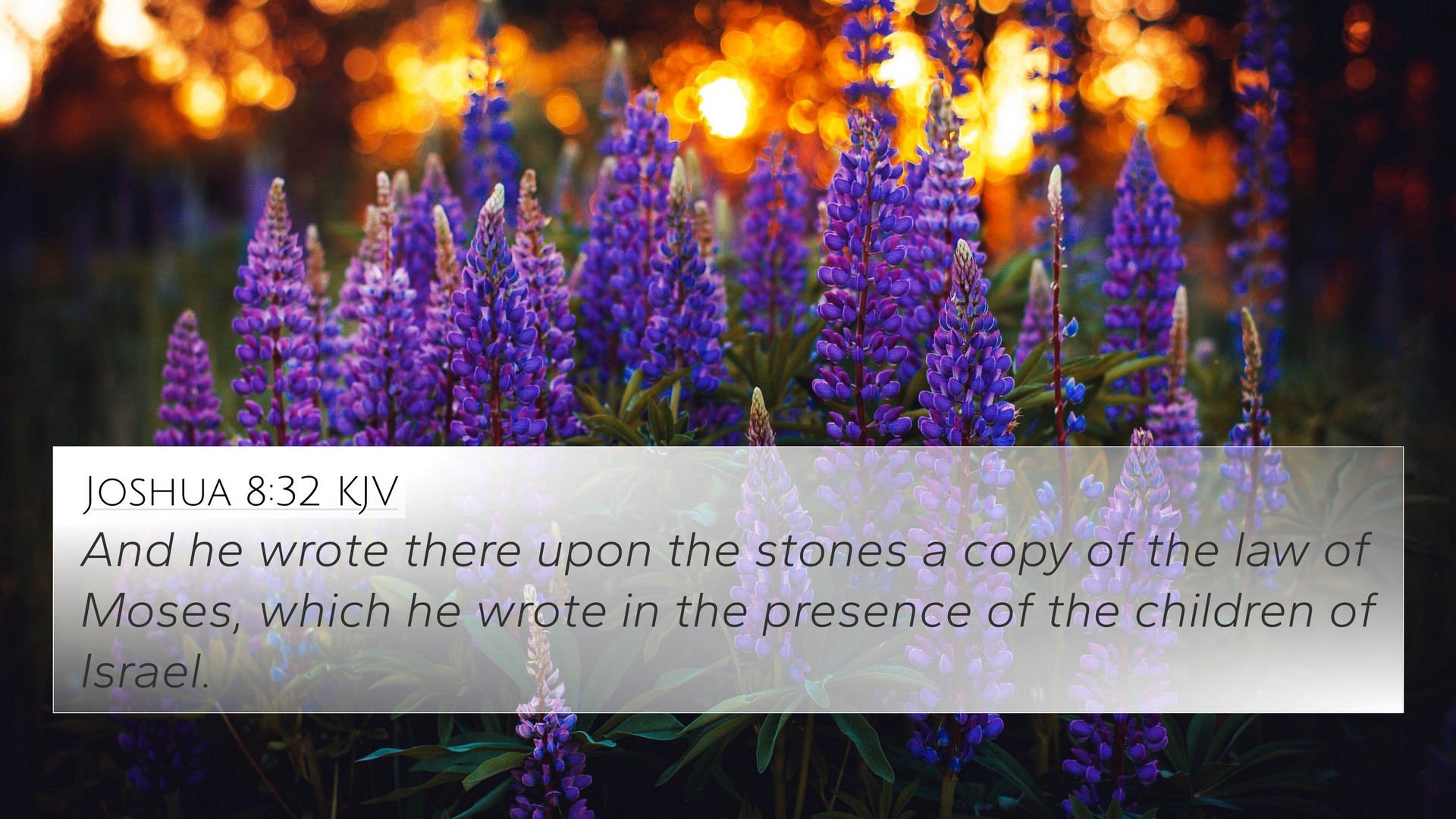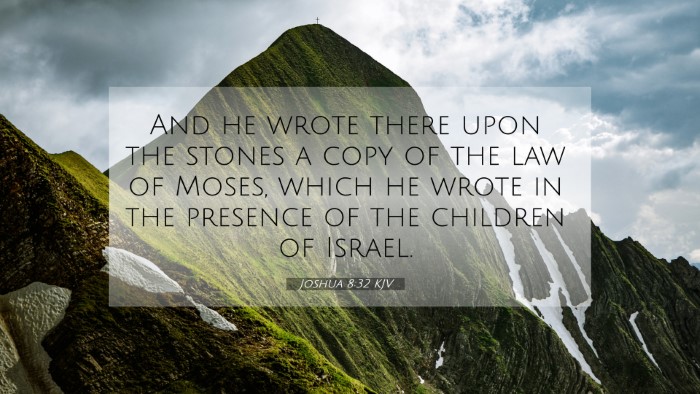Understanding Joshua 8:32
Joshua 8:32 states:
"And he wrote there upon the stones a copy of the law of Moses, which he wrote in the presence of the children of Israel."
The verse signifies a momentous task taken by Joshua following the conquest of Ai, where he emphasized the importance of God's law by inscribing it on stones. This act served as a permanent reminder of the covenant between God and His people.
Insights from Public Domain Commentaries
This section combines insights from renowned biblical commentaries to give a comprehensive interpretation of Joshua 8:32.
Matthew Henry's Commentary
Matthew Henry points out the significance of Joshua's actions, noting that writing the law serves to remind the Israelites of their obligations to God. By making this commitment in the presence of the people, Joshua sought to settle the covenant between God and Israel. It also signifies the importance of maintaining a tangible reminder of divine commandments, ensuring the people's instruction and accountability.
Albert Barnes' Notes on the Bible
Barnes emphasizes the public and communal aspect of this act. He suggests that by writing the law in front of all the people, it was a demonstration of unity and collective commitment. The stones represented permanence, signifying that God's moral law must endure as a foundation for the nation.
Adam Clarke's Commentary
Clarke elaborates on the context of the event, stating that the inscribing of the law was an act of devotion and obedience. By publicly displaying the law, Joshua aimed to instill reverence for God's word within the hearts of the Israelites. Clarke also notes the manner of writing, which points to the tradition of reciting and etching the word for posterity.
Key Themes and Cross References
This verse resonates with numerous themes throughout the Bible, forming connections with various other scriptures. Here are some essential themes and cross-references related to Joshua 8:32:
- Public Commitment to God's Law: Deuteronomy 27:2-8 - This passage outlines the ceremony of blessing and cursing, emphasizing public acknowledgment of God's commandments.
- Consequences of Obedience: Joshua 1:8 - This verse encourages meditation on the law, which leads to prosperity and success.
- Importance of Written Word: Revelation 1:3 - The blessing for those who read, hear, and keep the words of prophecy connects to the significance of God's written law.
- Celebration of God's Works: Psalms 78:5 - This scripture speaks to the importance of telling future generations about God's laws and works.
- Enduring Legacy of the Law: Matthew 5:17-19 - Jesus indicates that He came to fulfill the law, stressing its ongoing importance.
- Divine Instruction: 2 Timothy 3:16-17 - This affirms the inspiration and utility of Scripture for teaching and correction.
- Public Worship and Law: Nehemiah 8:1-3 - Ezra reads the law in front of the people, demonstrating a reflective return to God's commandments.
Thematic Connections
The act of inscribing the law reflects broader biblical themes such as:
- Obedience to God: The necessity of obeying divine instructions is a recurring theme throughout Scripture.
- Covenant Relationship: The covenant between God and His people is foundational to the Old Testament narrative, reiterated in both law and prophecy.
- Reminder and Reflection: The physical writing serves as a metaphor for the spiritual memory that believers are called to engage with God's word actively.
Tools for Cross-Referencing Biblical Texts
For those looking to explore connections between Bible verses, utilizing cross-referencing tools can enhance biblical study. Here are some effective methods:
- Use a Bible concordance to identify relevant keywords and topics.
- Visit a Bible cross-reference guide that highlights connections between verses across different books.
- Engage in cross-reference Bible studies to uncover relationships between themes.
- Employ a Bible cross-reference system that systematically organizes verses by themes or topics.
Conclusion
Joshua 8:32 serves as a reminder of our commitment to God's word and the importance of upholding His commandments within the community. By understanding the interconnectedness of the Scriptures, believers can deepen their faith and knowledge through careful study and reflection on how verses relate to one another.




